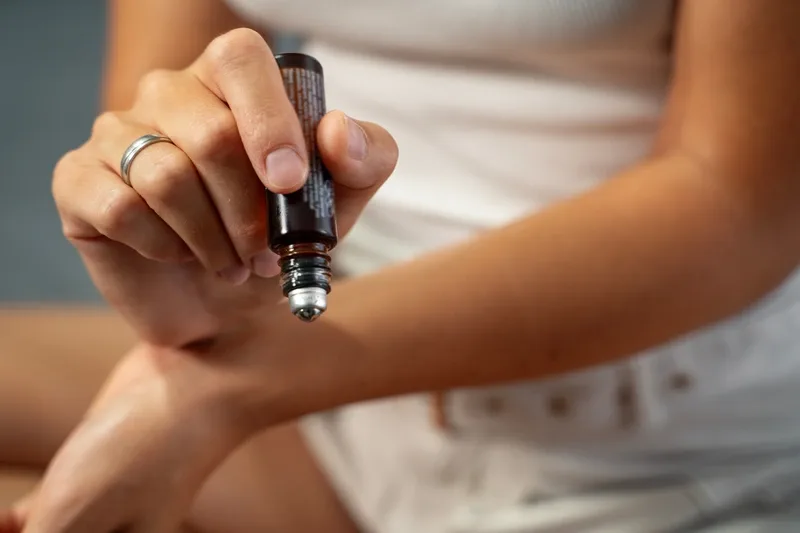Essential oils are often marketed as natural remedies for a range of menopausal symptoms, from hot flashes to mood changes. While many women report feeling better after using aromatherapy or essential oil-infused products, the scientific evidence behind these effects is still developing. Here's what current research says about the potential role of essential oils in menopause care.(1)
How Essential Oils Are Used During Menopause
Essential oils are concentrated plant extracts typically used in one of three ways: inhalation (aromatherapy), topical application (mixed with a carrier oil), or, in rare cases, ingestion (not safe without medical supervision). During menopause, women most commonly turn to essential oils for the following reasons:(2)(3)(4)
Anxiety or low mood
Hot flashes and night sweats
Sleep disturbances and fatigue
Vaginal dryness or discomfort
General quality-of-life support
These symptoms are linked to changing hormone levels, particularly the gradual decline in estrogen that occurs during perimenopause and menopause.(1)(2)(3)(4)
Essential Oils for Menopause Symptoms
Symptom | Essential Oil | Evidence Level | Comments |
Hot Flashes | Peppermint | Low | May provide cooling sensation when diluted and applied topically |
Hot Flashes | Clary Sage | Low | Thought to have estrogen-like effects; more research needed(2) |
Sleep Disturbances | Lavender | Moderate (RCTs available) | May improve sleep quality when used in aromatherapy |
Mood Changes | Lavender | Moderate | Associated with reduced anxiety; well tolerated in most people |
Mood Changes | Bergamot | Low–Moderate | May reduce stress and improve mood; used in inhalation therapy |
Mood Changes | Rose | Low | Suggested to support emotional well-being |
Vaginal Dryness | Rose Otto, Geranium | Very Low | Some use in topical blends, but safety for intravaginal use is unknown |
General Discomfort/QOL | Mixed blends (e.g., lavender + rose + geranium) | Low–Moderate | Aromatherapy massage may improve well-being; effects may be placebo-driven |
What the Evidence Shows
Although essential oils are widely used in holistic health circles, most of the evidence supporting their use for menopause symptoms is based on small or preliminary studies and needs validation through broader, controlled human trials. The following is a breakdown by symptom category:
Sleep and Stress Relief
Lavender is the most extensively studied essential oil in this category. Clinical trials suggest that lavender aromatherapy may help improve sleep quality and reduce stress. A few randomized controlled trials report modest improvements in relaxation and cortisol reduction when lavender, bergamot, or rose oil scent is inhaled.(3)(4)(5)
Hot Flashes and Thermoregulation
Some studies suggest that peppermint and clary sage oils may provide a cooling sensation when applied topically, which can be soothing during hot flashes. However, controlled trials are limited, and individual results vary. These oils do not influence the internal mechanisms that drive vasomotor symptoms.(2)(3)
Mood and Emotional Well-Being
Aromatherapy using oils like rose, ylang-ylang, and bergamot may support emotional well-being. These effects are typically short-term and may be influenced more by the experience of self-care and ritual than by the oils’ chemical actions. Still, some evidence suggests that certain aromatic compounds may affect neurotransmitter pathways involved in mood regulation.(1)(3)(5)
Vaginal and Genitourinary Symptoms
A few herbal preparations combine essential oils with carrier bases for external application. While these may provide temporary soothing effects, there’s not enough evidence to support their use for treating genitourinary syndrome of menopause (GSM). Intravaginal use of essential oils is not recommended due to the risk of irritation and disruption of the vaginal microbiome.(4)(5)
Endocrine and Hormonal Effects
Some essential oils, particularly lavender and tea tree oil, have been studied for possible endocrine-disrupting properties. In vitro studies suggest these oils may have weak estrogenic or antiandrogenic activity, but this has not been confirmed in long-term human studies. For most people, typical aromatherapy use does not appear to impact hormone levels in a meaningful way.(6)(7)
Challenges in Research and Regulation
Essential oils are not standardized, meaning their composition can vary depending on factors like the plant species, soil conditions, and how they’re made. This variability makes it hard to repeat research results or guarantee consistent health effects. Many essential oils are also sold with claims like “balancing hormones,” “detoxifying,” or “boosting immunity.” However, there’s no solid scientific proof behind these statements. Because of this, agencies like the FDA and FTC have warned or fined companies for making misleading health claims.(8)(9)

Potential Risks and Safety Considerations
Essential oils must be properly diluted before topical application to avoid skin irritation.
Scent inhalation is generally safe, but individuals with asthma or sensitivities should proceed with caution.
Ingestion should be avoided unless under medical supervision.
Quality varies by brand and batch, as essential oils are not regulated like medications.
Certain oils, including bergamot and lemon, can cause photosensitivity when applied to the skin before sun exposure.(3)
A few case reports have raised concerns about the potential hormonal activity of specific essential oils, but these findings are rare and typically involve prolonged, concentrated exposure in children or individuals with predisposing factors.(3)(6)(10)
Menopause & Essential Oils
While essential oils are not a replacement for evidence-based menopause treatments like hormone replacement therapy (HRT), they may offer a supportive role for certain symptoms. Benefits such as relaxation, stress reduction, and improved sleep have been observed in some studies, particularly with lavender and bergamot oils. However, more rigorous, large-scale research is needed to confirm their efficacy and safety in managing menopause symptoms.
For those interested in incorporating essential oils into a menopause care plan, it’s advisable to consult a healthcare professional and choose high-quality, well-diluted products. When used mindfully, essential oils can serve as a gentle addition to a broader symptom management strategy.
